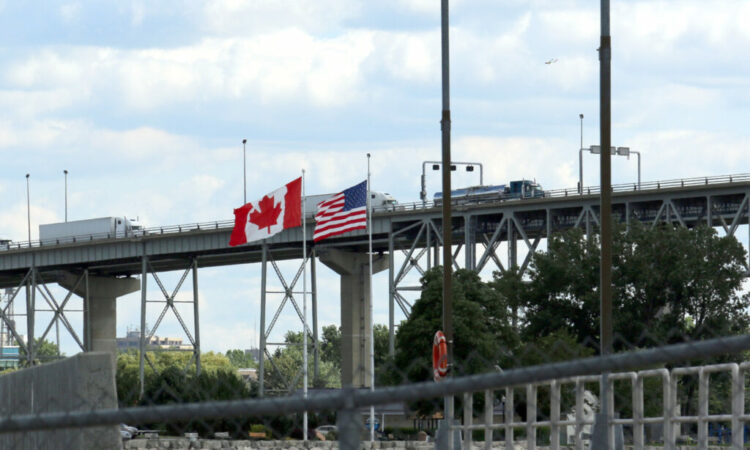Canada will require truck drivers to be vaccinated against Covid-19 before crossing the border as of Jan. 15, building on a similar announcement already made by U.S. regulators.
The news comes even as Canada prepares to ease several other travel restrictions. As of Nov. 30, for example, fully vaccinated individuals who leave and re-enter the country within 72 hours will no longer need to present a pre-entry molecular test.
Truck drivers, as essential workers, have to date been exempted from vaccine requirements before entering the country. They also haven’t been included in previous federal vaccine mandates that apply to the air, rail and marine sectors.
The Canadian Trucking Alliance (CTA) quickly responded that it will be pressing Canadian and U.S. authorities for more time to prepare for the border-related mandate, noting that the mid-January deadline gives little time for longhaul drivers to arrange for both shots, given the time they spend away from home.
‘Perfect storm brewing’
“We are extremely concerned there is a perfect storm brewing,” said CTA president Stephen Laskowski. “In light of worldwide supply chain disruptions and delays, it’s unclear how the supply chain and the trucking industry, in particular, can withstand further turmoil and maintain the service levels required to deliver critical products Canadians and Americans need.
“As we have seen throughout the world over the last year, supply chains are very fragile ecosystems and sometimes people’s overreactions to the threat of product shortages can cause even further problems,” he said. “We’ve seen firsthand how difficult it is to get certain products to market when supply chains are interrupted. And if these vaccination mandates are not handled with caution and great consideration, we could see those delays and shortages taken to levels that will create more anxiety for manufacturers and consumers alike.”
The Canadian Trucking Alliance estimates about 38,000 truck drivers could opt out of cross-border work in the face of a vaccine mandate. About 120,000 Canadian truck drivers run cross-border routes, while 40,000 U.S.-licensed truck drivers do the same.
While many Canadian trucking companies report 85-90% of their truck drivers are vaccinated, many carriers still have lower vaccination rates, depending on where they’re based, the alliance says.
‘45,000 are off limits’
“If you take the general population and assume the truck drivers are vaccinated at the same rate, it means 20% of drivers are not vaccinated. From 300,000 [total] drivers, 45,000 are off limits,” Private Motor Truck Council of Canada president Mike Millian said during a Truckload Carriers Association panel discussion on Thursday.
South of the border, business groups such as the American Trucking Associations (ATA) and Truckload Carriers Association (TCA) also continue legal challenges against U.S. plans to require businesses with more than 100 employees to adopt vaccine mandates. Although, U.S. Labor Secretary Marty Walsh has said solo drivers would be exempt from that mandate.
If U.S. truck drivers are truly exempt from the rule applying to larger businesses, the U.S. Department of Homeland Security will likely reverse vaccine mandates for border-crossing truckers, said TCA vice-president of government affairs David Heller, during a Thursday presentation in Brampton, Ont.
But U.S. legislators are unlikely to give Canadian truckers easier access to the U.S. than Americans enjoy, he said.
Low vaccination rates
Heller quoted surveys that suggest just half of U.S. drivers are vaccinated, with 62% saying they will not be vaccinated under any circumstances. By some estimates, applying a vaccine mandate to fleets with more than 100 employers could wipe out 37% of the driving workforce, he said.
“If this were to take effect and 37% of the industry leaves, imagine the lines at the gas stations and the local stores,” Heller said. “Even if we lose 1-2% of drivers in this market because of the vaccine mandate, there are tremendous problems.”
Under Canada’s evolving rules, border-crossing travelers to require vaccines as of the Jan. 15 deadline also include previously exempted international students, professional athletes, and those with work permits including temporary foreign workers outside the agriculture and food processing sectors.
Some unvaccinated people will still be allowed to cross the border, however, including agricultural and food processing workers, marine crew members, those entering on compassionate grounds, new permanent residents, resettling refugees, and some children under the age of 18. They’ll continue to be subject to testing, quarantine and other entry requirements.
“From the start of the pandemic our goal has been to protect the health and safety of Canadians and prevent the spread of Covid-19 through our borders. Our commitment to border security has helped keep Canadians safe, and as the situation continues to evolve and we open our borders to non-essential travel, we will continue to ensure that travellers meet all of the requirements for entry to Canada,” Public Safety Minister Marco Mendicino said in a release.
“As we restart many aspects of our economy, including travel, vaccination will continue to play an important role in keeping each other and our transportation systems safe and secure,” said Transport Minister Omar Alghabra.
“Vaccination is one of our best tools to finish the fight against Covid-19,” he added in a related press briefing.


